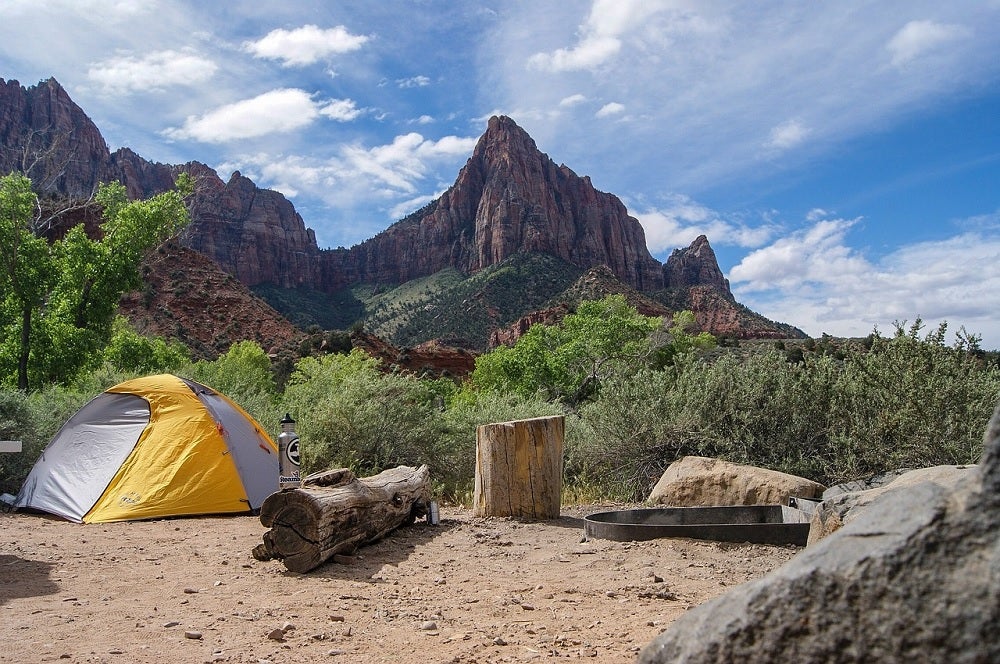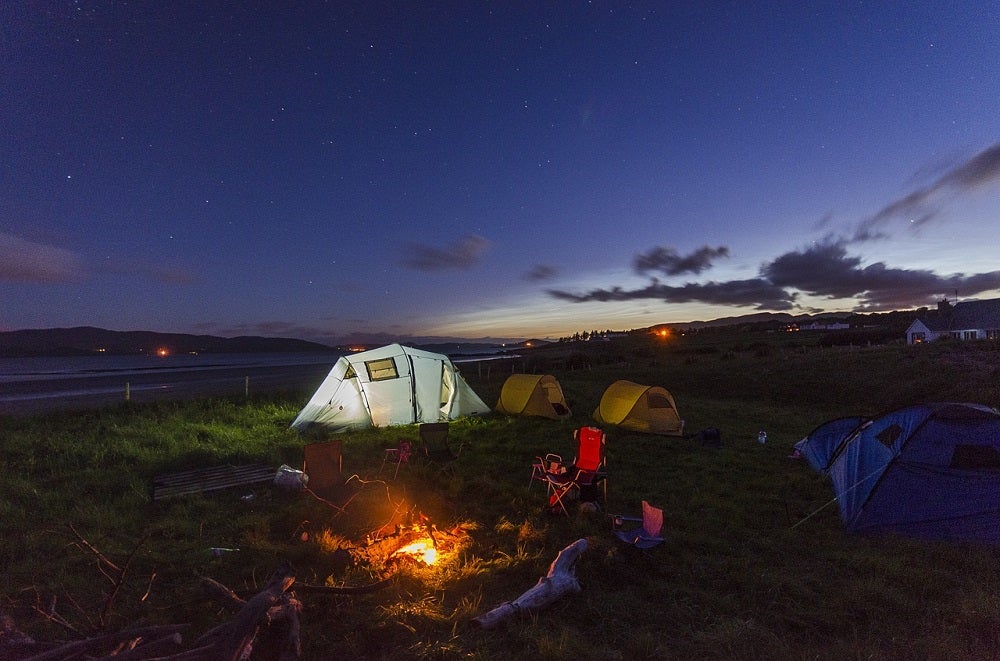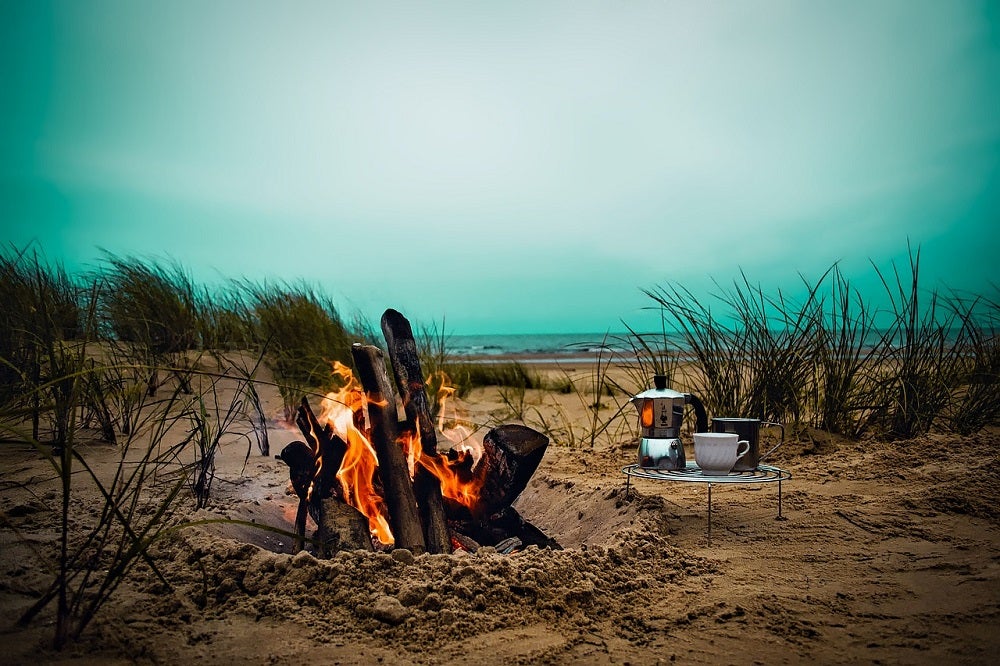
Our Editors independently research, test, and rate what we feel are the best products. We use affiliate links and may receive a small commission on purchases.
I absolutely love camping. It is probably my favorite thing to do in the summertime when the desert air is too dry and hot for extreme outdoor activity.
Lounging at your campground, however, and having fun with friends comes easily in the heat.
My least favorite part about camping is getting there. I’m always anxious and excited and the car ride can seem like it takes an eternity, especially when you are going far into the rough.
My second least favorite part, though, is setting up camp.
Depending on the time you arrive at your location, you may only have a short while before you run out of sunlight to get everything organized and prepared for the following day of fun in the sun.
At-home preparation is crucial. Obviously you should have everything packed in your backpack that you think you might need or want, but getting your campsite ready is important for your many reasons, including your safety.
An organized campsite is a safe campsite, so have everything you need in your pack and everything you need in your wheelhouse to set your camp up correctly. Forget something crucial or make a mistake and you could have grumpy young kids on your vacation.
Pick Your Spot
The first choice you will have to make when you arrive at camp is choosing a spot for your tent. This can feel like getting a new house as a child, especially when you are in a big group. Everyone gets through the door and rushes for the best room before yelling “dibs!” and slamming the door.
Prepare for this land rush ahead of time by doing your research about the campsite and arriving early to beat the rush.
High Ground
You want to find a spot on high ground to avoid any unwelcome surprises from a heavy rain like flash floods or puddling. High ground will also be a safer bet for you in the case of an emergency.
If you need to be rescued by an air ambulance flight, you need to be sure they can find you and that you are easily retrievable.
Dry Ground
Check the soil and foliage for signs of water damage like flattened grass, or water stained rocks. The higher the ground you choose, the less likely you are to be disturbed by rain when it comes, and all campers know that it can come out of the blue. Be prepared for soiled ground with extra tarps if necessary.
Flat Ground
Flat ground can be difficult to find, especially in more mountainous terrain, but it will make your campsite, and most importantly your sleeping area more comfortable. If you have the necessary equipment, you can attempt to level the ground where you plan to stay but this is often frowned upon, as most campsites should be left exactly as they are found.
Your Basic Necessities
Once you have established your location and you feel comfortable and confident there, you can begin preparing your basic essentials for survival in the wilderness: your food, water, shelter and sleeping arrangements.
Food
For some, camping means you have prepared your own food in advance and hauled it in. For others, camping means you will be cooking up a storm. Just be sure to have a grill or stove that’s up to the task!
No matter which type of camper you are, you need to be sure that your food is properly stored.
The safest way to store your food, whether it is Doritos or deer meat, is up high where it is out of reach from bears. Hanging a bear bag is simple and can be the difference between a relaxing camping experience and a vacation trapped in your van watching a bear tear through your belongings.
Coolers should be used for storing food that can spoil to avoid causing any illness while far from medical care. If you are roughing it, you might just use the nearest running stream or snowdrift to keep your items cold.
Water
Water should be at the top of your priority list when choosing a location to take yourself, your friends or your family. Not only is water the most important thing you need for survival, but it is the easiest thing to prepare for in advance by planning a proper destination.
Your campsite should be near some kind of body of water, whether it is a shallow running brook, snow melt, or a massive lake. You should also have with you some kind of water filtration system to use natural water for drinking if emergencies call for it.
Make sure you have brought several basins for cleaning and washing. You can fill the basin in the nearest water source and have an endless supply of extra water for setting up a handwashing station, a dishwashing station, or a laundry area.
Shelter
Your shelter is one of the first things to be completed when camping. If you have a nice tent, you can use this area for sleeping and storage of spare gear. If you are building a shelter from scratch, you can make it any way you please.
Shelters are also very important for housing you against extreme weather conditions and providing potential shelter from dangerous wildlife. Your shelter should be large enough for your cot, chairs and your things as well as sturdy and strong.
Other Campsite Considerations
Cleanliness
Keeping your campsite clean and organized will help you feel less stressed in nature and will help ensure you don’t leave any trash behind when you go.
You should be careful not to bring too many disposable items and be sure you have plenty of trash bags to collect any litter before you head home.
Cooking Area
Your cooking area should be established on some kind of table, makeshift or otherwise. A higher table will help keep dirt away from the food. Your cooking area should be equipped with a stove, cutting boards and utensils, cooking pans, foil, and anything else you might require for your planned meals.
Your cooking area should also have a handwashing station to make sure you are maintaining the same level of cooking cleanliness as you would at home. The handwashing station will be helpful for clearing any sticky foods from your fingers in a jif and cleaning pots and pans afterwards.
Cleaning Area
Your cleaning area should be a place where one can seek a shower, wash their hands and face and maybe clean their clothes if necessary. Your cleaning area should not be too close to your bathroom area, but close enough that you can seek privacy there.
Camping showers are fairly inexpensive and can be a lifesaver when you are in the wilderness. A clean shower feels amazing after several days of jungle fever.
If you have the luxury of a nearby outhouse, you don’t need to have an emergency toilet established, but it can be nice knowing it’s there just in case. You will most likely need some kind of bucket in the space too for cleaning your hands and face before meals.
Garbage Disposal
Much like your exposed foods, garbage needs to be far from your campsite. I understand this can be annoying, walking back and forth to dispose of a simple wrapper, but garbage can generate very pungent smells that can attract wildlife.
Avoid this by bringing trash bags that help eliminate odor and hanging them at least 50 yards from camp. 50 yards sounds like a lot, but it’s a lot of space between you and a potential moose or bear.
This might sound a little preachy, but do not ever leave your trash in nature. I can’t tell you how frustrating it is to be surrounded by majestic mountains, tall trees and colorful wildflowers and suddenly step on a crushed pop can. If you haul it in, haul it out and dispose of it properly.
A Few Hacks
- Coffee Can Toilet Paper Dispenser: Put a long slit in the side of an old Folgers can for a toilet dispensing roll. The roll stays in the jug while the slit allows for single sheets to come out at once. Cost effective and cleanly.
- Mason Jar Matchbox: Simply glue some sandpaper to the lid of mason jar and voilà, you have a jar for keeping your matches safe and dry and a mechanism for lighting them in a hurry.
- Tic-Tac Spices: Save your old tic-tac containers and store your herbs and spices for camping. Eggs, bacon, sausage and cayenne, yum!
- Emergency Medicine Kit: You use your pill organizers during the week to keep track of your dosage. Use the same container for camping to separate emergency medicine like motrin, tylenol and dramamine.
- DIY Firestarter: Do you have a grill out back for barbecuing? Use your charcoals and an old egg carton to create an egg-log firestarter for quick cooking. You should keep a quality fire starter in your camping kit.


